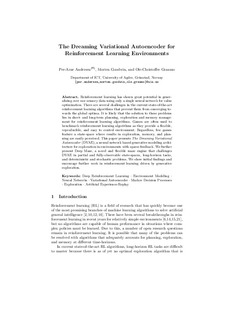The Dreaming Variational Autoencoder for Reinforcement Learning Environments
Journal article, Peer reviewed
Accepted version
Permanent lenke
http://hdl.handle.net/11250/2596208Utgivelsesdato
2018Metadata
Vis full innførselSamlinger
Originalversjon
Lecture Notes in Computer Science. 2018, LNCS (11311), 143-155. https://doi.org/10.1007/978-3-030-04191-5_11Sammendrag
Reinforcement learning has shown great potential in generalizing over raw sensory data using only a single neural network for value optimization. There are several challenges in the current state-of-the-art reinforcement learning algorithms that prevent them from converging towards the global optima. It is likely that the solution to these problems lies in short- and long-term planning, exploration and memory management for reinforcement learning algorithms. Games are often used to benchmark reinforcement learning algorithms as they provide a flexible, reproducible, and easy to control environment. Regardless, few games feature a state-space where results in exploration, memory, and planning are easily perceived. This paper presents The Dreaming Variational Autoencoder (DVAE), a neural network based generative modeling architecture for exploration in environments with sparse feedback. We further present Deep Maze, a novel and flexible maze engine that challenges DVAE in partial and fully-observable state-spaces, long-horizon tasks, and deterministic and stochastic problems. We show initial findings and encourage further work in reinforcement learning driven by generative exploration. The Dreaming Variational Autoencoder for Reinforcement Learning Environments
